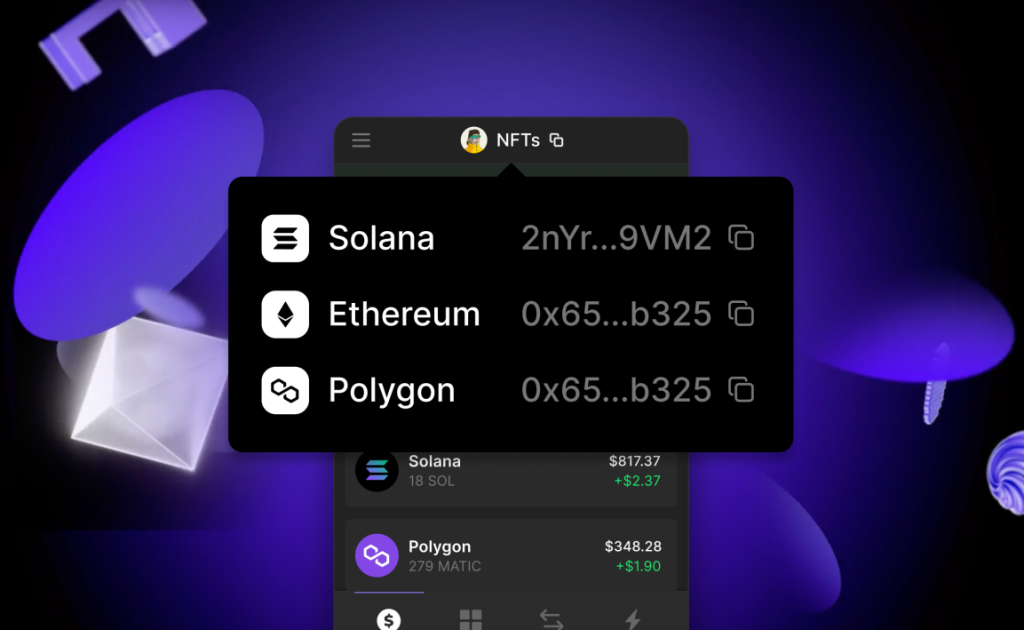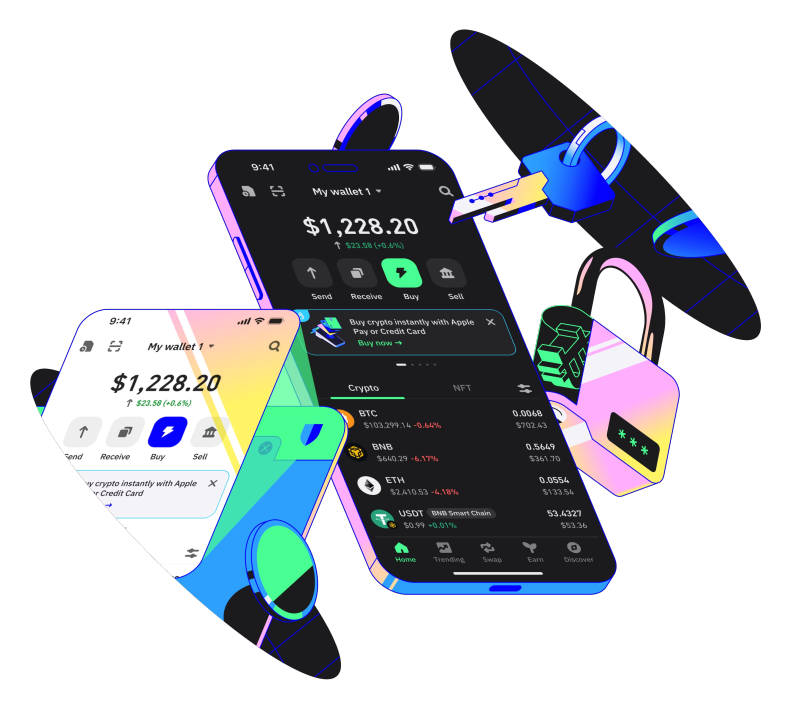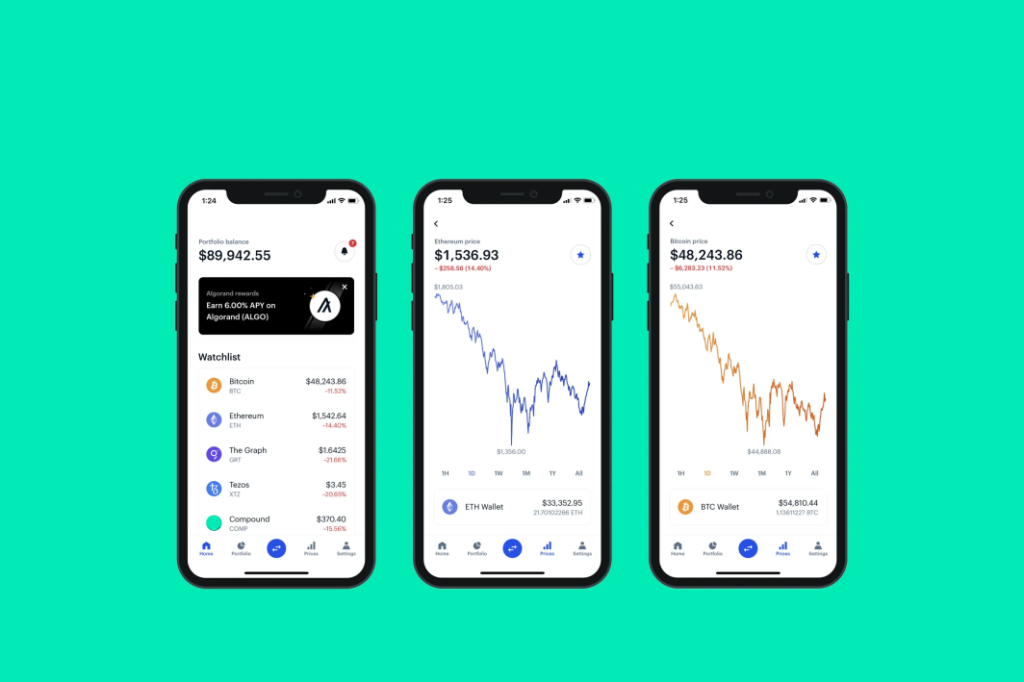Top Crypto Wallets 101: The Tools Every Investor Should Actually Be Using
Navigating the crypto world starts with the right wallet. In this Crypto Wallets 101: The Tools Every Investor Should Actually Be Using guide, we’ll show you the essential tools every investor should actually be using. Discover the types of wallets available and learn how to securely manage your digital assets.

Key Takeaways
- Crypto wallets are essential for securely storing and managing digital assets, with public and private keys being critical for transactions.
- There are various types of crypto wallets, including hardware, software, mobile, web, paper, and custodial, each with unique features and security levels.
- To protect digital assets, users should implement strong security measures, such as multi-factor authentication, regular backups, and using reputable wallets from official sources.
Understanding Crypto Wallets
A crypto wallet is a virtual wallet used to store and manage cryptocurrencies. Its primary function is to securely store and manage digital assets, keeping your investments safe from potential threats. Think of it as your personal wallet in the crypto world. But unlike traditional banks, crypto wallets give you complete control over your assets, without the need for intermediaries. In this way, a crypto wallet’s public key functions much like a bank account number for receiving funds, while the private key acts as your password for authorizing transactions.
At the heart of every crypto wallet are public and private keys. Public keys allow users to receive cryptocurrencies, while private keys are essential for accessing and managing these funds. A cryptocurrency address is generated from the public key and serves as a unique identifier used to send and receive digital assets.
Keeping your public key, sender’s private key (which is used to sign and authenticate transactions), and private keys safe is essential, as anyone with access to them can control your cryptocurrency.
These keys are fundamental to secure cryptocurrency transactions and ownership validation. Effectively managing a crypto wallet involves handling these keys to ensure the security of your digital assets.
Types of Crypto Wallets Explained
Cryptocurrency wallets come in various forms, each tailored to meet different wallets needs and preferences. These wallets can be broadly categorized into:
- Hardware wallets
- Software wallets
- Mobile wallets
- Web wallets
- Paper wallets
- Custodial wallets
Each type has its own unique set of features, advantages, and drawbacks, which we’ll explore in the following sections. Wallets are also commonly divided into hot and cold wallets: hot wallets are connected to the internet for easy access and use, while cold wallets remain offline for enhanced security. Knowing these differences helps in selecting the right wallet for your specific needs.
Crypto wallets offer diverse solutions for every kind of investor—from those seeking the highest security to those prioritizing convenience. Many investors use multiple wallets to manage, track, and secure their cryptocurrency holdings across different platforms or for different purposes. Let’s dive into the specifics of each type, starting with hardware wallets, which are known for their robust security features.
When setting up a new wallet, it’s important to consider user-friendliness, security features, and compatibility with various cryptocurrencies to ensure it matches your needs and security preferences.
Hardware Wallets
Hardware wallets are physical devices designed for secure cryptocurrency storage. These wallets keep private keys offline, providing an added layer of protection against hacking attempts. A cold wallet is a type of cryptocurrency wallet that is not connected to the internet, making it highly secure against cyber attacks and ideal for long-term holding. The key vault is stored in a separate memory bank, further enhancing security. This makes hardware wallets an excellent choice for those who prioritize security over convenience.
However, hardware wallets do have their drawbacks. The main risk associated with these wallets is physical theft. Confirming crypto transactions can also be inconvenient, especially for frequent crypto traders. Cold wallets, such as hardware wallets and paper wallets, are ideal for long-term storage due to their offline nature and enhanced security compared to hot wallets.
Prices for these wallets range from $49 to $220, providing options to suit different budgets. Some popular hardware wallets include the Ledger Nano S, which is known for its affordability, support for multiple cryptocurrencies, and integration with other software wallets. Despite these challenges, the high level of security they offer makes them a popular choice among serious investors.
Software Wallets
Software wallets are digital applications installed on computers and smartphones, offering a convenient way to manage cryptocurrencies. A hot wallet is a software-based wallet connected to the internet, making it suitable for daily transactions.
A software wallet, such as desktop wallets, provides the flexibility of accessing digital assets from multiple devices, making them popular among crypto users.
A notable example is Guarda Wallet, which supports over 400,000 cryptocurrencies and is available on desktop, mobile, and browser platforms. This versatility ensures that you can manage your assets seamlessly, regardless of your preferred device.
Mobile Wallets
Mobile wallets offer convenience, allowing users to access their cryptocurrency on-the-go. Installed on smartphones, they provide a seamless mobile experience. Trust Wallet, for instance, is known for its user-friendly interface and robust security features, making it a convenient tool for managing digital assets and mobile wallet.
Other examples include Coinbase Wallet, which integrates seamlessly with the Coinbase cryptocurrency exchanges, offering a comprehensive solution for storage and trading.
Web Wallets
Accessed through internet browsers, web wallets can be either hosted or non-hosted. Non-hosted wallets offer better control over funds by keeping the private keys in the user’s hands, especially when using a browser extension wallet or online wallets.
MetaMask, a popular web wallet, acts as a gateway to blockchain technology applications, simplifying access and interaction with decentralized app (dApps). This feature makes web wallets attractive for those looking to engage with the broader blockchain ecosystem.
Paper Wallets
A paper wallet is a physical document containing a public address and a private key for cryptocurrency. Keeping the keys offline and printed on paper, paper wallets minimize the risk of online hacks, making them a secure storage method. Ideal for long-term storage, this type of wallet provides a level of security that digital wallets connected to the internet cannot match.
Creating a paper wallet involves generating and printing the public and private keys on paper. Although this method keeps keys offline, it carries risks if not generated securely. Ensure the computer used for generating the keys is free from malware and store the paper wallet in a safe location to prevent theft or damage.
Custodial Wallets
Custodial wallets are managed by third-party providers, giving them control over your private keys. This can simplify access and management of cryptocurrencies, making them easier to use compared to non-custodial wallets. However, entrusting a third party with control over your private keys introduces significant security risks. A custodial wallet can be a convenient option for users who prioritize ease of use.
Should the provider be compromised, your assets could be at risk.
Key Features to Look for in a Crypto Wallet
When choosing a crypto wallet, consider several key features to ensure the security and usability of your digital assets:
- Use strong passwords and enable multi-signature features to protect your cryptocurrency holdings.
- Regularly back up your wallet and encrypt those backups to enhance security.
- Utilize backup options like seed phrases, which are vital for recovering access to your wallet if needed.
The best crypto wallet for you will depend on your specific needs for security, usability, and how you plan to manage your assets.
Key features of a cryptocurrency management user interface include:
- A user-friendly interface that makes cryptocurrency management accessible, particularly for beginners.
- Compatibility across multiple devices, allowing seamless access and management of crypto assets.
- Push notifications that enhance user experience by keeping you informed about account activities without constant checks.
Select a wallet based on the following criteria:
- Supports a wide variety of cryptocurrencies, allowing for greater flexibility in managing different digital assets.
- Supports unique assets like NFTs to ensure it meets all your cryptocurrency needs.
- Offers customer support options, like those provided by Coinbase Wallet, to ensure assistance is available when needed.
Popular wallets such as MetaMask, Coinbase Wallet, and Trust Wallet are favored for their user-friendly interfaces and robust security features.
Always download your own wallet directly from official sources to avoid scams and protect your assets.
How to Secure Your Crypto Wallet
Securing your crypto wallet is crucial for protecting your digital assets. Wallets are the primary way to store cryptocurrency securely, rather than leaving funds on exchanges, which can be less secure. Enabling multi factor authentication and two-factor authentication (2FA) protects accounts from unauthorized access. This adds an extra layer of security, requiring a second form of verification even if someone should gain access to your password.
Additionally, keeping your private keys offline effectively secures your cryptocurrency assets. Offline storage, like hardware or paper wallets, ensures that your keys are not vulnerable to online attacks. However, if you do not securely back up your seed phrase or recovery phrase, you could lose access to your crypto holdings permanently.
Phishing scams commonly threaten crypto wallets. Always download wallets from official websites to protect against scams. Be cautious when searching for wallets in the Apple App Store or Google Play, as scam wallets can appear at the top of search results—always verify you are downloading the legitimate app. Regularly updating wallet software safeguards against vulnerabilities and improves overall stability.
Staying vigilant and implementing these security measures helps protect significantly reduces the risk of your assets being compromised through effective security practices.
Wallet Management
Effective wallet management is essential for any crypto investor aiming to keep their digital assets secure and easily accessible. With the growing variety of wallets—ranging from hardware wallets and cold storage solutions to hot wallets like mobile wallets and desktop wallets—it’s important to adopt best practices that help protect your investments and streamline your crypto transactions.
Start by using strong, unique passwords for each wallet and always enable two factor authentication (2FA) or multi factor authentication (MFA) where available. This extra layer of security helps prevent unauthorized access to your wallets and private keys. Regularly updating your wallet software is also crucial, as it ensures compatibility with the latest blockchain technology and protects against emerging security risks.
Backing up your wallet is another key step. Store your seed phrase or recovery phrase in a secure, offline location—never share it online or with untrusted sources. For long-term storage of significant crypto assets, consider using a hardware wallet or cold storage solution, which keeps your private keys offline and safe from online threats.
When using hot wallets, such as those on your mobile device or desktop, make sure you’re connected to a secure internet connection and always verify transactions through a user friendly interface. It’s also wise to diversify your wallets—use separate wallets for different cryptocurrencies or for different purposes, such as trading versus holding.
Stay vigilant against phishing scams and other security risks by only downloading wallet software from official sources and double-checking website URLs. By following these wallet management strategies, you can help ensure your private keys remain safe and your digital assets are always within your control.
Top Crypto Wallets for Investors
Choosing the right crypto wallet is crucial for any investor. The best crypto wallets provide secure storage for digital assets, protecting your investments. Many top wallets offer unique benefits like integrated exchanges, advanced security features, and user-friendly designs. Wallets like Trezor, Ledger Nano X, Exodus, and Coinbase Wallet support multiple cryptocurrencies, making them versatile for various investors. Whether you are a beginner or an experienced investor, a suitable wallet is available for you.
Explore some of the top crypto wallets and many crypto wallets for investors, detailing their features and benefits. These recommendations are based on their security, ease of use, and support for a wide range of cryptocurrencies.
Ledger Nano X
The Ledger Nano X is a top-tier hardware wallet known for its robust security features and versatility. Key features include:
- Support for over 5,500 cryptocurrencies
- Ability to install up to 100 apps for managing different assets
- Bluetooth connectivity for seamless pairing with mobile devices for on-the-go access
- Utilization of a Secure Element chip and proprietary Ledger OS to enhance security by keeping private keys offline.
One standout feature of the Ledger Nano X is its recovery option, which allows users to restore access to their wallet using a secret recovery phrase. Its compact design, measuring 72mm x 18.6mm and weighing only 34g, makes it easy to carry.
For investors seeking a reliable and secure hardware wallet, the Ledger Nano X is an excellent choice.
Trezor Model T
The Trezor Model T is a leading hardware wallet known for its advanced features and security. It features a large touchscreen interface for easier navigation, making it user-friendly. The Trezor Model T supports a wide range of cryptocurrencies, making it versatile for investors.
Its robust security measures ensure that your crypto assets are stored safely, providing peace of mind for serious investors.
Coinbase Wallet
Coinbase Wallet integrates seamlessly with the Coinbase crypto exchange, allowing users to effortlessly manage their digital assets and bitcoin wallet across both platforms. It employs multi-signature security, offering an additional layer of protection for users’ cryptocurrencies.
With its user-friendly interface, Coinbase Wallet makes it easy for users to navigate their crypto holdings and transactions. This wallet is particularly recommended for beginner investors due to its accessibility and comprehensive support.
MetaMask
MetaMask is a web wallet known for its accessibility and versatility, making it suitable for a wide range of investors. It integrates seamlessly with popular decentralized applications (dApps), facilitating interactions with NFTs and DeFi protocols on the Ethereum blockchain. MetaMask also supports networks like Binance Smart Chain, which uses staking and bonding mechanisms to prevent double-spend attacks.
MetaMask’s user-friendly design and robust security features make it a valuable tool for anyone looking to engage with the broader blockchain ecosystem.
Trust Wallet
Trust Wallet is a popular mobile cryptocurrency wallet known for:
- Its user-friendly interface
- Support for various cryptocurrencies
- Integration with hardware wallets like Ledger and Trezor, providing enhanced security for users’ assets
- A mobile-friendly design that allows users to manage their digital assets on the go, making it convenient for everyday transactions.
Trust Wallet incorporates robust security measures, such as private key storage on the user’s device, ensuring that assets remain safe from external threats.
Exodus Wallet
Exodus Wallet is a popular choice for cryptocurrency users due to its intuitive design and feature-rich environment. Key features of Exodus Wallet include a user-friendly interface, built-in exchange, and support for multiple cryptocurrencies. The built-in exchange allows users to trade cryptocurrencies seamlessly within the app, providing a convenient solution for managing digital assets.
Overall, Exodus Wallet offers an accessible platform for managing diverse digital assets along with trading capabilities. Its comprehensive support options and regular updates enhance user experience and confidence when managing their assets.
Common Mistakes to Avoid with Crypto Wallets
In the world of cryptocurrencies, even small mistakes can lead to significant losses. One of the most common mistakes is failing to back up seed phrase, which can lead to irreversible loss of access to crypto holdings. Always ensure that you have multiple backups of your seed phrase stored in secure locations.
Using untrusted wallets is another common pitfall. These wallets can be designed to steal funds and personal information, so always use reputable wallets and download them from official sources.
Neglecting security updates is another critical mistake. Regularly updating your wallet software is essential to protect against vulnerabilities and improve overall security.
By staying informed and proactive about these common mistakes, you can better protect your digital assets and ensure a safer crypto experience.
Crypto Investor Resources
Navigating the world of cryptocurrency can be complex, but a wealth of resources is available to help investors make informed decisions and protect their digital assets. Whether you’re new to crypto or a seasoned investor, leveraging the right tools and platforms can enhance your experience and security.
- Educational Platforms: Dive into websites and online courses that cover everything from blockchain technology fundamentals to advanced wallet management and crypto trading strategies. These resources help you stay up-to-date with the latest trends and best practices.
- Community Forums: Join online forums and social media groups where crypto users share insights, discuss market movements, and offer support. Engaging with these communities can provide valuable real-world advice and help you avoid common pitfalls.
- Wallet Providers: Explore secure and user-friendly wallet solutions like Trust Wallet, MetaMask, and Coinbase Wallet. Many of these wallets offer features such as integrated exchanges, portfolio tracking, and robust security measures to help you manage your digital assets efficiently.
- Exchange Services: Use reputable cryptocurrency exchanges like Binance and Kraken for buying, selling, and trading a wide range of cryptocurrencies. These platforms often include advanced trading tools and strong security measures to safeguard your funds.
- Security Tools: Protect your crypto assets with hardware wallets, antivirus software, and other security tools designed to keep your wallets and private keys safe from hacking attempts and malware.
- Market Analysis Tools: Access real-time market data, price charts, and analytical platforms to track your investments and make data-driven decisions in the fast-moving crypto market.
- Regulatory Resources: Stay informed about the legal landscape by consulting government websites and legal services that provide guidance on cryptocurrency regulations, tax obligations, and compliance requirements in your jurisdiction.
By tapping into these crypto investor resources, you can strengthen your knowledge, refine your investment strategies, and implement effective security measures to protect your digital assets in the ever-evolving world of cryptocurrency.
Summary
Choosing the right crypto wallet and securing it properly are vital steps in managing your digital assets. From understanding the different types of wallets to knowing the key features to look for, this guide has provided you with the knowledge needed to make informed decisions. Remember to implement robust security measures and stay vigilant against common mistakes. By doing so, you can confidently navigate the crypto world and protect your investments. Stay informed, stay secure, and keep your digital assets safe.
Frequently Asked Questions
Can the IRS see your crypto wallet?
Yes, the IRS will gain visibility into your crypto wallet starting in 2026, as they will receive 1099-DA forms from crypto brokers detailing your trading activities, including transaction dates and wallet addresses. This increased oversight emphasizes the importance of maintaining accurate records of your crypto transactions.
What is a crypto wallet?
A crypto wallet is essentially a virtual tool for securely storing and managing your cryptocurrencies, enabling transactions of digital assets with ease. It is crucial for anyone involved in the crypto space.
What are the different types of crypto wallets?
The types of crypto wallets consist of hardware wallets, software wallets, mobile wallets, web wallets, paper wallets, and custodial wallets. Each serves distinct purposes and offers varying levels of security and convenience.
How do I secure my crypto wallet?
To effectively secure your crypto wallet, enable two-factor authentication, store private keys offline, regularly update wallet software, and ensure you only download wallets from reputable sources. This proactive approach will significantly enhance your wallet’s security.
What are the best crypto wallets for investors?
The best crypto wallets for investors are Ledger Nano X, Trezor Model T, Coinbase Wallet, MetaMask, Trust Wallet, and Exodus Wallet. Each offers unique features catering to various security and usability needs.










